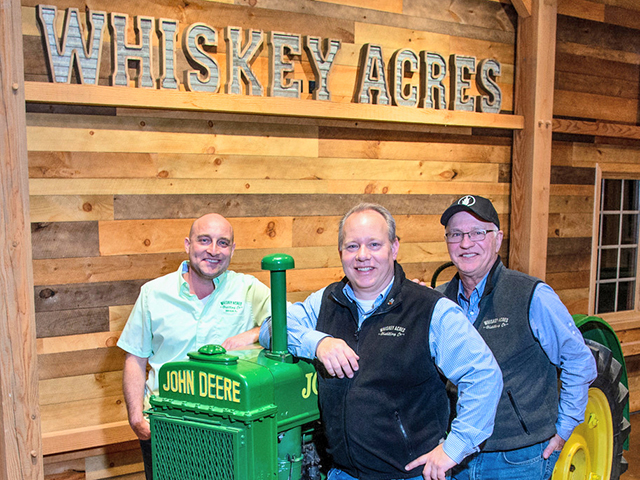A Shot of Sanitizer
In early March, Whiskey Acres Distilling Co. was making plans to expand its DeKalb, Illinois-based and award-winning spirits business to Nebraska. But, the rapid spread of the COVID-19 pandemic swept those plans aside.
Only a few days later, Whiskey Acres president and CEO Jamie Walter prepared his production line to produce hand sanitizer instead. Hand sanitizer has disappeared from retail store shelves and is in short supply in doctors' offices and even hospitals. Walter believes the distillery that produces buckets of alcohol could help stem the shortage of the product.
Walter saw the family's business literally drying up by the hour. Its 4,000-square-foot bar and retail space closed a week before the decision to shift production. Whiskey Acres' products were also sold in restaurants, which were closed in Illinois. The Nebraska plans are on hold. "We're down to grocery and liquor stores," Walter says. "A significant piece of our revenue has dried up."
Whiskey Acres, paired with a commercial, 2,000-acre grain farm, produces internationally recognized bourbons, rye and vodka, sold in Illinois and Wisconsin.
It also produces an artisan series of bourbon from an imaginative stock of ingredients, including blue popcorn, Oaxacan heirloom corn and someday, perhaps, sweet corn. The family has been farming about 60 miles west of Chicago since the Great Depression.
The distillery opened in 2014 as a way to diversify the farm, which once included seed sales and a crop-insurance business. The distillery has since become the largest piece of the total business.
P[L1] D[0x0] M[300x250] OOP[F] ADUNIT[] T[]
"We were quickly making a name for ourselves in this space," Walter says.
He is also concerned about his employees. Whiskey Acres has five full-time employees and 15 part-timers. He is loyal to them. They also represent a skill base he does not want to lose. But, employed to do what? A production line that ran two shifts seven days per week is now a single shift, Monday through Friday.
The sanitizer idea came up when shortages made headlines. Sanitizer is made from ethanol, glycerol and hydrogen peroxide. Walter had not been able to secure aloe vera, an ingredient used to make a gel form of hand sanitizer, so the product will be a spray.
"We want to do this partially to fill a need. There really is a shortage," Walter explains. "It has some marketing and PR [public relations] value, too. But, third, and this is a surprise to me, it's become important to our employees. They want to contribute."
DISTILLERIES JOIN THE FIGHT
Eight Oaks Farm Distillery, in New Tripoli, Pennsylvania, is another distillery entering the highly in-demand world of hand sanitizers. Logan Snyder, cofounder and director for distillery operations, says the work contributes to the supply of a hard-to-find item and keeps employees employed.
Eight Oaks is a veteran-owned, family-run craft distillery on 300 acres located in Pennsylvania's Lehigh Valley, about 70 miles north of Philadelphia. The corn, wheat, rye and barley produced there are routed through the distillery. The distillery sells bourbon, rye whiskey, rum, vodka, gin and applejack.
Bottles for the hand sanitizer were one challenge for Eight Oaks Farm. The former owner of a soap store heard of the distillery's efforts and donated 7,500 8-ounce and 2-ounce bottles, Snyder explains, as another truck full of bottles pulls into the distillery's drive.
Snyder says Eight Oaks Farm intends to start distribution locally then move out regionally. Children's Hospital of Philadelphia will be one of the first recipients. "I was surprised it was short of sanitizer," Snyder says.
Their asking price? Make a free-will donation. You can make a donation to the Eight Oaks Hand Sanitizer Project at eightoaksdistillery.com.
"We're upset with the hoarders, so we are doing what we can do, maybe push prices down," Snyder says. With enough bottles and pumps, Eight Oaks can produce several thousand bottles per week.
[PF_0520]
(c) Copyright 2020 DTN, LLC. All rights reserved.




